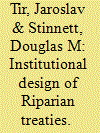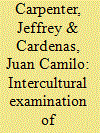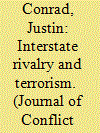|
|
|
Sort Order |
|
|
|
Items / Page
|
|
|
|
|
|
|
| Srl | Item |
| 1 |
ID:
107928


|
|
|
|
|
| Publication |
2011.
|
| Summary/Abstract |
The relationship between conflict and education has been studied before. However, previous authors have always focused strongly on the supply-side effects, whereas this article examines the influence of conflict on the demand for education. It is theoretically shown that, under relatively general conditions, individuals living in a conflict area have an incentive to increase their level of education and that this effect depends on the individual's skill level. This hypothesis is tested using the conflict in the Basque Region as a case study, which is an example of a conflict in which one would not expect strong supply-side effects. Using other Spanish regions, an artificial region is created in which the population has a similar educational distribution as in the Basque Region. When comparing the true and artificial regions, individuals with a medium education level clearly show an increase in education during the conflict, as predicted by the theoretical model.
|
|
|
|
|
|
|
|
|
|
|
|
|
|
|
|
| 2 |
ID:
107920


|
|
|
|
|
| Publication |
2011.
|
| Summary/Abstract |
Most aid spending by governments seeking to rebuild social and political order is based on an opportunity-cost theory of distracting potential recruits. The logic is that gainfully employed young men are less likely to participate in political violence, implying a positive correlation between unemployment and violence in locations with active insurgencies. The authors test that prediction in Afghanistan, Iraq, and the Philippines, using survey data on unemployment and two newly available measures of insurgency: (1) attacks against government and allied forces and (2) violence that kill civilians. Contrary to the opportunity-cost theory, the data emphatically reject a positive correlation between unemployment and attacks against government and allied forces (p < .05 percent). There is no significant relationship between unemployment and the rate of insurgent attacks that kill civilians. The authors identify several potential explanations, introducing the notion of insurgent precision to adjudicate between the possibilities that predation on one hand, and security measures and information costs on the other, account for the negative correlation between unemployment and violence in these three conflicts.
|
|
|
|
|
|
|
|
|
|
|
|
|
|
|
|
| 3 |
ID:
107922


|
|
|
|
|
| Publication |
2011.
|
| Summary/Abstract |
The authors analyze a bargaining model of war that incorporates both commitment problems due to shifting power and asymmetric information. Four results emerge when both bargaining problems are present. First, in contrast to asymmetric information models, the resolution of uncertainty through fighting can lead to the continuation of war rather than its termination. Second, wars can be less-not more-likely to end in settlement the longer they last. Third, war aims increase over time as a belligerent becomes more confident that its opponent will grow unacceptably strong in the future. Finally, the dynamics that characterize wars in purely asymmetric information or commitment models should exist only when the other factor is absent.
|
|
|
|
|
|
|
|
|
|
|
|
|
|
|
|
| 4 |
ID:
107925


|
|
|
|
|
| Publication |
2011.
|
| Summary/Abstract |
International agreements governing rivers vary considerably in whether they contain institutional provisions for joint monitoring, conflict resolution, enforcement, and/or the delegation of authority to intergovernmental organizations. This article develops an explanation for why some river management treaties include more institutional provisions while others contain fewer, if any. The authors argue that certain types of issues related to river use-water quantity, water quality, and navigation-tend to be difficult to manage and prone to noncompliance. When forming treaties to address these specific issues, states will be more likely to include institutional provisions. The authors test the link between these river use issues and institutional design using a data set of 315 river treaties signed since 1950. The results show that highly contentious issues-and in particular water quantity and navigation-have a greater effect on the institutional design of river treaties than contextual and power politics factors.
|
|
|
|
|
|
|
|
|
|
|
|
|
|
|
|
| 5 |
ID:
107927


|
|
|
|
|
| Publication |
2011.
|
| Summary/Abstract |
We design a real-time, intercultural common pool resource experiment using participants from cultures that derive different benefits from a global public good (extraction vs. conservation of biodiversity resources) to analyze the effect of group affiliation on cooperative behavior. We also collect survey attitudes toward conservation to augment our experimental results. We find that when participants interact interculturally, extraction choices change significantly and that these changes can be attributed to an amplification of the relationship between attitudes and choices cued by the intercultural treatment.
|
|
|
|
|
|
|
|
|
|
|
|
|
|
|
|
| 6 |
ID:
107921


|
|
|
|
|
| Publication |
2011.
|
| Summary/Abstract |
Existing scholarly research on terrorism has largely ignored the role of international relations and its effects on patterns of terrorism. This study argues that strategic interstate relationships can affect the amount of terrorism that a state experiences and should be considered along with "traditional" determinants of terrorism, such as domestic institutional and macroeconomic variables. The study specifically looks at state sponsorship of terrorism, arguing that while we cannot reliably identify state sponsors of terror, we can indirectly observe relevant evidence of state sponsorship. To support this claim, the study examines the annual number of transnational terrorist attacks that occurred in all countries during the period 1975-2003. The results demonstrate that states involved in ongoing rivalries with other states are the victims of more terrorist attacks than states that are not involved in such hostile interstate relationships.
|
|
|
|
|
|
|
|
|
|
|
|
|
|
|
|
| 7 |
ID:
107924


|
|
|
|
|
| Publication |
2011.
|
| Summary/Abstract |
While economic sanctions are commonly regarded as nonviolent coercive diplomacy, scholars show that senders-particularly democratic senders-are actually more likely to use military force against the targets of their sanctions. In this article, the authors extend this connection between sanctions and military action by arguing that countries targeted with third-party economic coercion are more likely to be targets of dyadic militarized violence from states not involved in the sanctions. The act of sanctioning, the authors argue, lowers the prohibitions to use violence against the sanctioned state by others. Empirical analysis of dyadic data from 1914 to 2000 shows that, within directed dyads, militarized interstate dispute (MID) initiation is more likely when the potential target of conflict is sanctioned by third-party states, particularly when the sanctioning state is a large democracy.
|
|
|
|
|
|
|
|
|
|
|
|
|
|
|
|
|
|
|
|
|